Home » Jazz Articles » Interview » Dan Shout: In With a Shout
Dan Shout: In With a Shout
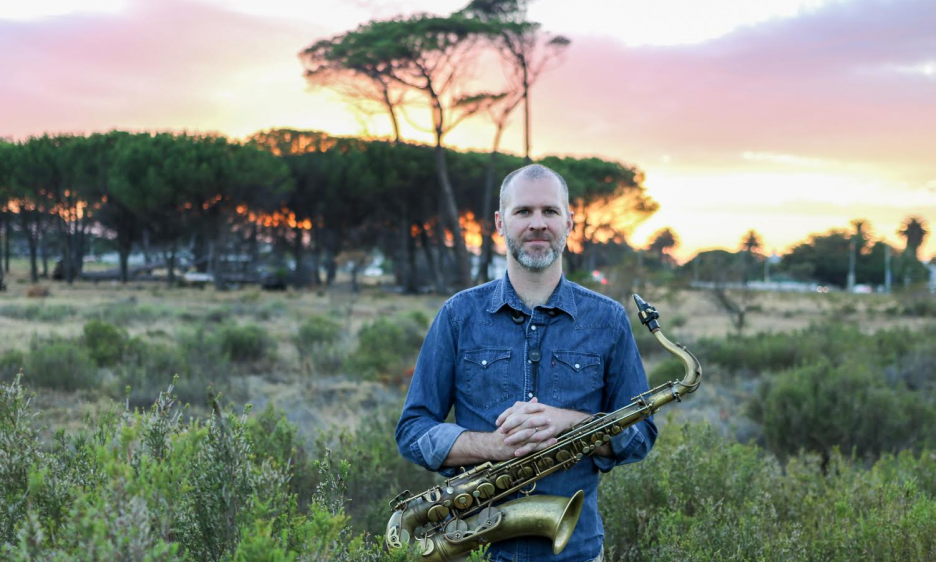
My experiences as a Southern African growing up in Africa and the stories of these songs, my family, and our culture are my secret weapons.
—Dan Shout
All About Jazz: With your latest albums and the In With a Shout project, you feature an unusual frontline of three saxophones. It represents an expansion from your earlier ensembles. Can you talk about what inspired that?
Dan Shout: I think one of the biggest influencing factors was doing a tour around the United States with Johnny Clegg and
Ladysmith Black Mambazo
band / ensemble / orchestraThere was also the issue of who I wanted to play with. Cape Town's got some phenomenal Jazz musicians, but they don't play the same style. So even though someone's amazing, they're not necessarily compatible. I really let who I wanted to play with guide me in terms of personnel on the album.
To be honest, I don't know a whole bunch about arranging. But once I'd already done my first In With a Shout album there were some experienced arrangers who said to me, "Wow, that's unusual to have three tenors." I didn't really think too much about it, because I thought it worked. Now, on the new album Secret Weapons, Sisonke Xonti—who was on the last album—had moved to Joburg. It made it a bit trickier to develop ideas or to record with him. So I used Justin Bellairs, who's a great alto player. I felt that gave me an extra arrow in the quiver, because I do feel having that the alto as the lead voice can cut through a little bit more, like a trumpet would've done in a three-horn section. So although I thought the three tenors worked out on the last album, having alto on this one actually worked out quite well. Really, the thinking behind it was just that I wanted to do some ensemble writing that was bigger than a quartet, but with people that I wanted to work with who are good players. I got to experiment with the concept of having a male vocal trio, except instrumentally.
AAJ: On both In With a Shout and Secret Weapons, you also prominently feature the electric guitar, with Gorm Helfjord on In With a Shout and Michael Bester on Secret Weapons. In fact, it sounds like a fourth lead voice in the way you write for it.
DS: I'm a huge lover of guitar. I actually came to Jazz later in life when I went to varsity, but before that I was a full-on rocker: Metallica, Megadeth, and that sort of stuff. I've always had a soft spot for guitar. Gorm Helfjord and I obviously had a fantastic relationship. Hopefully I will work with him in the future of course, but he moved back to Norway. Initially, I wrote the Secret Weapons album without guitar, because I didn't want to put just any guitarist in. So it was actually more piano based with Andrew Ford.
Luckily, when Gorm went back to Norway, Michael Bester happened to move back to Cape Town. I had worked with Michael over the last couple of years, but that was up in Johannesburg in more of the corporate sort of scene. I was aware of what a fantastic player he is, because I met him when I studied with him at UCT [University of Cape Town] back in the early 2000s. Since then, he's done a hell of a lot of gigs around the whole of South Africa, and spent a year at Berklee in Valencia, Spain. Then, his wife got a job in Cape Town so he ended up moving back to Cape Town. And I was like, "Well, what God giveth with one hand, he taketh with the other!" Gorm left and Michael Bester has come back.
I like guitarists who have got more of a rock sound, but who can play Jazz. I like people who could play on a hollow body and play a straight-ahead Wes Montgomery vibe, but who can also play with pedals and distortion. So when Michael came back, I just said to him, "Hey man, I'm just about to record this album. Please, could you play on it?" And funnily enough, when I did a gig up in Joburg with the same material about two years ago, I couldn't take my whole band. So I took two or three guys up, and then the rest of the band were actually guys already living there. Then, I filled the band with two or three other friends of mine who hadn't done the project, and Michael was one of them. So he was familiar with the material when we went to record, but it had been developed quite a lot more since when he first played it. But he's a ridiculous professional. I started to write for guitar in a more more complicated or more complex way, because he literally plays the horn lines exactly like the horns do, whereas I would give Gorm more free rein to go and do what he thought was best. Michael and Gorm each brought different strengths to the sound. I'm acutely aware that guitar and saxophone work very well together, so sometimes I would double certain things on the guitar that I was playing, or on another part just to reinforce it. But I would also give them the rhythmic aspect and the improv aspect as well.
AAJ: On both albums, but particularly on In With a Shout, one hears the strong influence of Cape artists like the Dyers brothers.
DS: I think there are some hugely influential genres of South African Jazz, particularly from up north. The only problem for me is that I didn't really come to Jazz through those genres. I came to Jazz while I was at UCT, studying classical clarinet. Some of the guys who were a few years ahead of me were people like
Melanie Scholtz
vocals
Winston Mankunku Ngozi
saxophone1943 - 2009
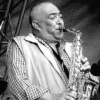
Robbie Jansen
saxophone, alto1949 - 2010
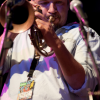
Marcus Wyatt
trumpet
Hugh Masekela
flugelhorn1939 - 2018

Miriam Makeba
vocals1932 - 2008

Bheki Mseleku
piano1955 - 2008
DS: I'm a busking composer and arranger, a trial-and-error composer and arranger. Having said that, I play a lot of ensemble music, whether it's big band or tentet, and all sorts of different people's compositions. I think I know generally how it's supposed to sound if it's good. I'm not necessarily sure how to do that, pen-to-paper like a "real" arranger. But it's something I love and it's something I work on and study. I'm always trying to improve myself the whole time. So I think that on In With a Shout, I really felt I took a huge turn in sort of picking the correct personnel for the album, writing better for them, and also discovering myself as to what I wanted to say and who I am and keeping it real in a way. With this album three years later, I think I took another huge step in the right direction. Now I'm trying to find where I think I'm going with it.
Another thing that I must reference is that about three years ago, I was very lucky to play with

Maria Schneider
composer / conductorAnother thing I did better on this album is that I let the songs breathe a little bit. I wrote them, I performed them, I got my UCT ensembles to perform them, and then I'd listen to them and go, "What's missing? What isn't kicking? How could I improve it?" I slowly chipped away until they were ready. Funnily enough, I've got about three or four more songs that I thought I was going to record, which I didn't record because I thought the seven that I've put down on the last album were the ones that were ready to go. So for me it's just really trial and error and just trying to improve all the time.
AAJ: There are a number of musical through-lines connecting the two albums, and in both cases you certainly work with a variety of different genres.
DS: I don't consider myself a seasoned composer. I end up sitting down to write a song and it goes on a route. Like I mentioned, I've got a lot of different influences that I love. I came from rock and metal, and I studied classical clarinet. My gateway drug to Jazz was South African Jazz of course. But I also love funk; I love Horace Silver and Lee Morgan. There's one song in the new album called "Beer Jersey Boogaloo," which I specifically tried to write in a Soul Jazz sort of way. If I had to sit down and write like eight songs in one style, I think that would be really hard for me to do. That's why the songs are quite different on the album. I do think on every album I have a funk tune; "Tea with Alvin" on the last one was Brecker-esque, dare I say it. And then on "Bennie's Farm," again I was writing about a feeling. Bennie's Farm is one of my friend's farm. Things always start off funky there, and then they get a bit strange in the middle of the night after we braaied and had a couple too many gin and tonics, and then they always end up ok in the morning! I think at the time I composed that song, I was listening a lot to

Lettuce
band / ensemble / orchestrab.1992
AAJ: Looking at some of the collaborators you've worked with, you've managed to bring in almost a Who's Who of great drummers in South Africa across your albums!
DS: Yeah, I love them. It's a treat to play with them.
AAJ: Are these collaborators the "secret weapons" you reference in the album title?
DS: I found myself having a set of compositions, and thinking of what I'm trying to say, where I'm trying to go with it in terms of what I'm saying in the Southern African landscape. There are a lot of phenomenal players, some very heavy duty players in South Africa who are dealing with concepts that I'm not equipped to deal with. Concepts like apartheid South Africa, or the New South Africa, or where things are going wrong or are unfair in South Africa. Whilst I note all that, I wasn't raised in South Africa. I was born in a free Zimbabwe, I was raised in a free Namibia, and I grew up in South Africa. Whilst I'm obviously sensitive to those topics, I think if I'm to keep it real, I don't really have a place to sort of deal with those issues. It's not really me to do that. What I'm trying to do is create an album which deals with some of the positives, and is more lighthearted.
I'm trying to present a fourth stream in South African Jazz that is not what other people are doing, because I think we are always trying to find our differentiation in the marketplace. So how I've mentioned already came to Jazz through Cape Jazz as opposed to northern South African Jazz, and I mentioned how I haven't come from the same background as a lot of South Africans. I'm trying to still put something forward, something I think is complex but not necessarily too profound. I'm a joker. I'm a beer drinker. I love my sport. But also love Jazz, you know?
Secret Weapons deals with the fact that for starters, even famous Jazz musicians are unknown. If I say to my buddies, "Have you checked out the new

Branford Marsalis
saxophoneb.1960
AAJ: With the latest album, you partnered with PathWay Records on its release. Your prior albums were self-released efforts. What changed?
DS: About three years ago, I went to perform at the Wigan International Jazz Festival in England. It was there that I heard a saxophonist called

Paul Booth
saxophoneb.1977

Ryan Quigley
trumpet
Stan Getz
saxophone, tenor1927 - 1991

Clifford Brown
trumpetb.1930
You say that sort of thing all the time, and it usually doesn't necessarily come off. But a year later, I got an Instagram message from Paul, saying, "Hey Dan, I'm coming to Cape Town on holiday. Are you around?" And I said, "Sure, I'll show you some wine farms!" And he came out and jammed on a couple of gigs with me. We had some fun and we really just got on exceptionally well. It was a real treat to hang out with him and get to jam with him. That's when he told me about his recording label. At the time I didn't really think too much of it, except that he told me it was a record label that specifically deals with Jazz in a more World Music vein. I thought that was very interesting. Two years later, I was doing the Secret Weapons album, and was about to go through the usual route of just uploading it onto CDBaby, getting it onto iTunes and Spotify and everything.
But then I thought, "Let me just drop Paul a line and see if he'd be interested." I thought that I'd love to be associated with him. Maybe he could give me some tips and let me know how he goes about releasing his albums. I can't say enough as to how helpful he was and how encouraging he was in getting me onto his label and assisting me with all the questions that I had. It's just been fantastic. I think when I go over to England again, he would be part of the project playing my music, which is another secret weapon.
So I thought to try a new way of releasing the album, to learn from the guys who are doing this all the time, and see where it takes me. So right from album cover design to the release date, ISRC codes, and where to punt the album, Paul just gave me advice. Before, you feel like you're a lone ninja. So to have a little team together who back what you're doing and think it's good is quite encouraging. It feels like I'm going up a step all the time, as opposed to backwards.
AAJ: You referenced on a few occasions the idea of the artists as your secret weapons, and the guest appearance of

Gordon Vernick
trumpetDS: That's a long story, but I'll try to keep it short. About ten years ago, I turned on my Mac, and on the Apple homepage it said "The year was 1959, one of the most influential years in Jazz history. Click on this for a free podcast." I thought, "Oh great, this is awesome." The guy who presented the podcast was Gordon Vernick. I listened to these Jazz history podcasts of his. They were about fifteen minutes each, and they were awesome. I started to look him up online, but I couldn't find any way to contact him except for a form on his website. So I filled out the form really casually, like "Hey Gordon, my name is Dan Shout, I'm from Cape Town. I Love Jazz, I love your podcast. I'm associated with UCT, and next year is the Soccer World Cup in South Africa. If you're ever thinking about coming this way, give me a shout. Would be great to have you." Done. About two, three months later I get this inbox in my mail: "Hey Dan, this is Gordon Vernick. I'd love to come to South Africa. I'm the coordinator of Jazz Studies at Georgia State University, and I've got funding to bring myself. All I need is an official invite, and I'm there." Boom. Cool. So I sent him an invite through
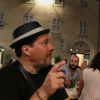 "
data-original-title="" title="">Mike Rossi at the University of Cape Town. Next thing, Gordon was an on an airplane, and we just hit it off.
"
data-original-title="" title="">Mike Rossi at the University of Cape Town. Next thing, Gordon was an on an airplane, and we just hit it off. He just did his tenth trip to South Africa this year, where he conducted the South African National Schools Big Band at Grahamstown, which he had also helped me with two years ago. He's also the guy who gave

Darren English
trumpetb.1990
Gordon was out while I was recording that album, and I said, "Hey man, it would be a great honor if you would blow some changes." To have somebody who has had nine million downloads of his Jazz history lectures on iTunes now play on my album is a fairy tale story for me, coming from Zimbabwe and Namibia. And then again, tying in with Secret Weapons, he's another one of my secret weapons. He's a world-class trumpet player, and a really good friend. We actually recorded another track together, by the way. It's not released yet, but I did my own arrangement of "Angola" by

Bheki Mseleku
piano1955 - 2008
Kevin Gibson
drumsI've learned a hell of a lot since I've met Gordon. He's taken me under his wing and spoken to me about things I need to work on. I've been hugely grateful for that, so it was just great to have him on the album.
AAJ: It's a fantastic track, and it does jump out quite a bit, given the woodwind frontline on the rest of the album.
DS: I was thinking about putting sax on it. But Andrew Ford, the pianist who recorded the album and did a lot of the mixing and mastering, said to me, "You know, let's not put sax on here. It'll be so refreshing to just have trumpet." I think he nailed it.
AAJ: You've already referenced coming to Jazz via a circuitous route, and indeed your compositions reflect that. When we think about your career, you have a substantial track record as a session musician. You had long musical association with Johnny Clegg. Can you talk a bit about some of those professional experiences prior to your solo records?
DS: While I was studying at UCT, I was very lucky to be there in this sort of golden age of the brand new South Africa. I began high school in 1994, which is the year of the New South Africa, and I found myself at UCT in 1999. That was pretty much a fresh start in a way, and a lot of the Jazz that was happening in Cape Town with some of the names that I mentioned earlier was just so exciting. A lot of the legends were still alive, your Winston Mankunkus and your Robbie Jansens. You could still see them at jam sessions and play with them.
I would say that my first lucky breaks were playing with Darryl Andrew's tentet that would feature Winston Mankunku a lot, and also playing with the UCT Big Band who would feature alumni. I slowly found myself doing all sorts of society gigs, corporates, weddings, and that sort of stuff. I was really just on a massive learning curve, and there was almost no style of music that I didn't learn something from. I'd be jamming with House DJs, and then on the same night I might be playing with the big band or in a tentet with Cape Jazz legends. Or I might be at the SAJE conference playing big band music with someone like " data-original-title="" title="">Chris Collins.
So I was really going through this massive learning curve, playing all these different styles of music. It's really hard for me to actually say which were the most amazing gigs that I did over the years, because I've been very lucky. I got to played Jacob Zuma's second inauguration, where I was in the stage band backing loads of South African pop bands like Mango Groove. At the same time, I had a seven-year stint with Johnny Clegg, which was a massive learning experience. I love all sorts of different types of music, and I guess I'm proud of the fact that they come out in what I guess you could say is my Jazz—or "Not Jazz," depending on how strict you are! It's just coming from a place of loving and being excited about a whole bunch of different styles of music. I played any gig I could get my hands on. I loved it.
AAJ: You've referenced a number of mentor figures to you. You also developed as a teacher throughout your career. How did you impart this broader view to students?
DS: That's quite a hard one, to be honest, because I think being a teacher is about consistently learning. You can think you've got it all figured out, and then suddenly you realize that what works for one type of student does not work for another type of student. I think a lot of the young kids nowadays practice a lot harder and a lot more studiously than we did twenty years ago. But they sometimes lack the understanding that we are part of a community, we're part of the Cape Town Jazz community and the South African Jazz fraternity. If you're locking yourself in a practice room and you're smashing "Giant Steps" and "Cherokee" but you never go to the jam sessions and you don't know who our local legends are, then it's almost pointless in a way. That's very important to me. I was taking Improv I at UCT last year, and there were some very good young cats, but the huge thing I told them was, "Hey guys, I'm not seeing you at jam sessions or at gigs. What's going on? You're not seeing the big picture here." It's not about tritone substitutions. That's useless if you're not part of this thing. Life is so short.
For me, having mentors like Gordon Vernick, Mike Campbell, and Andrew Lilley, I have people around that I'm asking questions of all the time. Things like, "I'm trying to do this, how do you voice that? How did you do that?" A lot of time, the people who were my mentors weren't saxophone players. Most of my saxophone heroes are overseas and large. So with the advent of YouTube, or the fact that you can buy a

Chad Lefkowitz-Brown
saxophone, tenorb.1989
I find that if you're not trying to keep your sword sharp by checking out what's going on in the States and Europe, then you're going to come unstuck. The younger guys are going to overtake you. And then in the cases when you have a Justin Bellairs who has overtaken you in terms of playing, I found that I was able to offer advice and experience in terms of time on the mile, gigging and preparing albums, or dealing with people in invoicing and contracts. Even super young players who are really advanced, like a Justin Bellairs or a Benjamin Jephta, they might not have the life experience. So then I try to offer them information they wouldn't have had. So it's tricky, I'm not going to lie. I do think that Jazz Education is getting better and better, and particularly in South Africa. Our players are getting exposed to more and more, they're traveling more, and they're collaborating with people from overseas. There are some incredible things going on. You can think you're nailing one sort of genre, and then somebody else comes killing it with a totally different thing.
AAJ: On this idea of continued development and growth, we talked already about the kind of expanded instrumental lineup in Secret Weapons. Is there a vision to take that further with larger ensemble efforts?
DS: I guess the answer would be yes. I think I'd like to still do another album with a similar lineup and take the ideas a step further. I'd make them a bit more mature. I love the last album, but I feel like this latest one took a big step up, and I think that the third one would take as big a leap up again. Having said that, I just arranged my first big band chart yesterday. Like I mentioned, I didn't study arrangement, and I've never had a reason to do a big band chart. But annually I organize a big band gig for charity at my old high school, because we're trying to create a scholarship for music. One of the bands in Cape Town is a great ska band called Grassy Spark, and we wanted to do one of their tunes for the big band. So I arranged a big band chart for it.
I think that the bug has possibly bitten for me to do some more big band arranging. But I think that I'd need to spend some time studying that a bit more. Of course, I've played a lot of big band music and I know the general sound, but knowing the general vibe and being a quality big band arranger are two totally different things. So for now, I'd like to keep it at the size it is, and then pull people in as the music needs. Whether that's a trumpet solo, or a trombone, or maybe there are some brilliant marimba players in town that I'd love to use. I've got some ideas bubbling in the back of my mind, but not necessarily going bigger. I'd like to get more quality and more mature. If that leads to doing something bigger then sure, no problem. The other problem is I'm entirely self funded, so I basically slay wedding season and Cape Town, which is about seven months, and I work my ass off. I really love that because I'm playing with basically the same guys on my album, we just happen to be putting on suits and playing "Have You Met Miss Jones?," which is a jol, playing wine farms, drinking shiraz, and making people happy. But then I save money to do another Jazz album, which is basically a flag-waving expedition.
When I do these sorts of albums, I'm doing them purely for artistic creativity and to keep my soul happy. I would love to do some bigger stuff, but only if and when it's called for.
Photo Credit: Team Team Photography
Selected Discography:
Dan Shout, Serenading Ghosts, (Self Released, 2012)
Dan Shout, In With a Shout, (Self Released, 2014)
In With a Shout, Secret Weapons, (PathWay Records, 2018)
Tags
Interviews
Seton Hawkins
South Africa
Cape Town
Ladysmith Black Mambazo
Kesivan Naidoo
melanie scholtz
Winston Mankunku Ngozi
Robbie Jansen
Selaelo Selota
Marcus Wyatt
Hugh Masekela
Miriam Makeba
Bheki Mseleku
Maria Schneider
Lettuce
Branford Marsalis
Paul Booth
Ryan Quigley
Stan Getz
Clifford Brown
Gordon Vernick
Mike Rossi
Darren English
Kevin Gibson
Chris Collins
Chad Lefkowitz-Brown
Benjamin Jephta
Comments
PREVIOUS / NEXT
Support All About Jazz
 All About Jazz has been a pillar of jazz since 1995, championing it as an art form and, more importantly, supporting the musicians who make it. Our enduring commitment has made "AAJ" one of the most culturally important websites of its kind, read by hundreds of thousands of fans, musicians and industry figures every month.
All About Jazz has been a pillar of jazz since 1995, championing it as an art form and, more importantly, supporting the musicians who make it. Our enduring commitment has made "AAJ" one of the most culturally important websites of its kind, read by hundreds of thousands of fans, musicians and industry figures every month.
Go Ad Free!
To maintain our platform while developing new means to foster jazz discovery and connectivity, we need your help. You can become a sustaining member for as little as $20 and in return, we'll immediately hide those pesky ads plus provide access to future articles for a full year. This winning combination vastly improves your AAJ experience and allow us to vigorously build on the pioneering work we first started in 1995. So enjoy an ad-free AAJ experience and help us remain a positive beacon for jazz by making a donation today.

Cape Town
Concert Guide | Venue Guide | Local Businesses
| More...



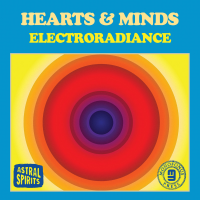
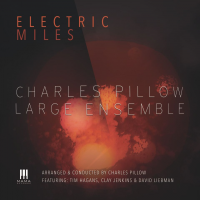

 Buy Now
Buy Now























